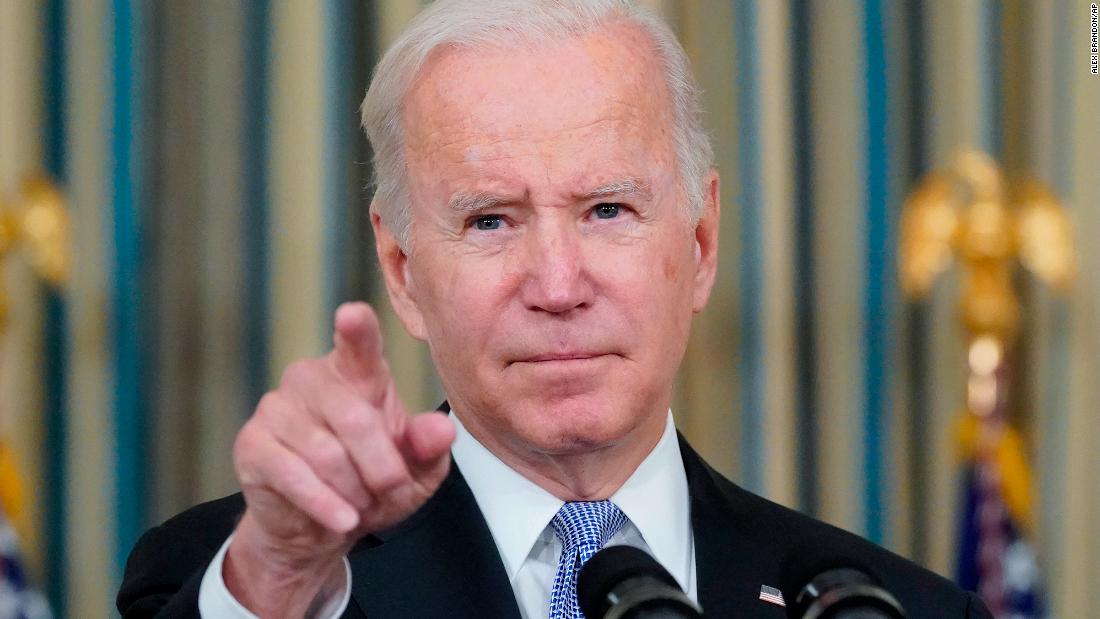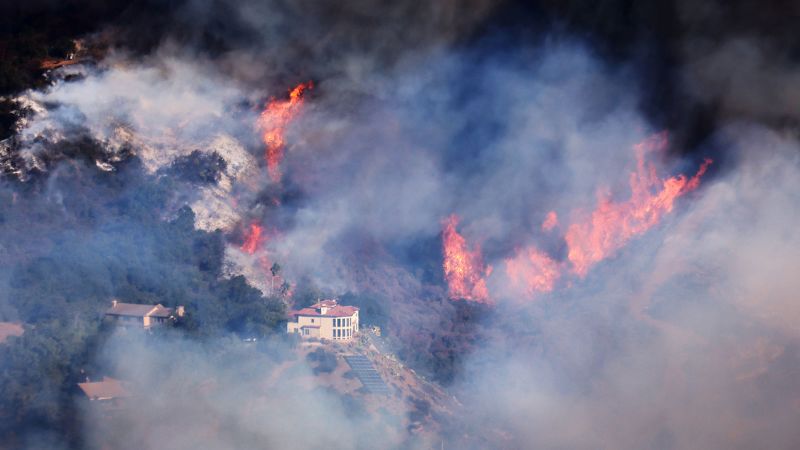(Trends Wide) — The $ 1 trillion infrastructure bill that President Joe Biden will sign is a much-needed political victory and a vindication of his entire political creed. But on its own, it is unlikely to rescue a presidency reeling from the looming midterm elections.
If ever a president has needed a breather, it has been Biden, after a brutal few months battered by the pandemic, the ensuing economic storm, and his own mismanaged withdrawal from Afghanistan.
In recent months, Biden has often been beset by multiple challenges, raising questions about his authority and his ability to restore the calm and competent leadership that voters craved when they elected him in 2020. Even the most moderate members of his own party have wondered if the president’s decision to adopt a transformative agenda despite tiny majorities in Congress was counterproductive. And the deeper issues plaguing his presidency, the doubts about whether the Democrats’ message fits the mood of the country, and the historical factors weighing against first-term presidents in midterm elections mean that a big legislative victory may not launch a comeback.
But if the 2022 campaign did begin after last week’s gubernatorial elections in Virginia and New Jersey, which further tarnished the Democratic brand, it could hardly have gotten off to a better start for Biden.
On Friday morning, a wave of optimism greeted new official data showing that the economy created 531,000 jobs in October after several scandalously bad months. The news that Pfizer is seeking regulatory approval for a highly effective pill to treat COVID-19, the new authorization of vaccines for children ages 5 to 11, and figures showing that 70% of American adults are now fully Vaccinated people offered the promise of escaping the pandemic after many false sunrises.
Then, on Friday night, Biden scored his biggest Capitol victory to date, with the House of Representatives passing the infrastructure measure that had been withheld by progressives seeking collateral in a large social spending bill. which Biden hopes to approve next.
A landmark federal effort to repair the nation’s bumpy highways, aging airports, dilapidated bridges, and antiquated railroads will soon be underway, with more funding earmarked for rural broadband and catalyzing a rapid evolution of electric vehicles. .
Several Democrats, including Virginia Sen. Mark Warner, argued that if the bill – which was approved by the Senate in August – had been signed into law earlier, Democrat Terry McAuliffe could have been elected Commonwealth Governor instead. from Republican Glenn Youngkin last week. But Warner also highlighted Friday night’s victory in an attempt to turn the page for Democrats, who must now show they can sell the benefits of the bill more effectively than they have done so far by marketing the agenda. of Biden.
“What a difference a week makes,” Warner told Trends Wide’s Dana Bash on “State of the Union” this Sunday. On the same show, Republican Maryland Governor Larry Hogan admitted that passing the bill was a major victory, but argued that the tortuous political process required to pass it would limit his political power. “It should have been an overwhelming victory in August, and I think (Biden) shouldn’t have let it get sidetracked by progressives in the House,” Hogan told Bash.
A bill that will go down in history
However, the presidencies unfold in several parallel realities. If the bill is a success, 30 years from now no one will remember the excruciating political drama that surrounded its passage and it will be a major milestone in Biden’s legacy.
The measure also represents an important political claim for the president. He anchored his 2020 campaign on the argument that he could use the government to tilt the economy toward American workers. He says the infrastructure plan will create the kind of safe, blue-collar jobs America has been losing for years.
In the past decade, the idea of an infrastructure reform project had become a Washington joke. But Biden accomplished something that former Presidents Barack Obama and Donald Trump failed to accomplish, despite his own hopes for splendid infrastructure bills.
Almost alone in Washington, Biden also believed he could win Republican support for an infrastructure plan that would demonstrate that Washington’s polarized and traumatized system could continue to function as intended. In the end, he got 19 GOP senators and 13 House Republicans to vote for it, a relatively small group but still rare bipartisanship in modern Washington.
“I’ve been told all the time that I can’t do any of this,” Biden told reporters Saturday. “From the beginning … You didn’t think we could do any of this. And I don’t blame you. Because you look at the facts and wonder,” How is this going to be done? “
The president was right in his rare return to victory in the White House. And after weeks in which he has been unable to quell the fighting in his own Democratic Party, his reputation as a consummate negotiator in Congress may be partially restored.
However, bolstering his legacy with a landmark legislative achievement can do little to ease Democrats’ woes in the short term. More immediately, there is the issue of social spending legislation that accompanies the law, aimed at transforming early childhood education, home care for the sick and the elderly, and facing the challenge of saving a planet affected by global warming.
The infrastructure bill was passed thanks to a compromise between progressives and moderates in the House of Representatives, according to which the latter agreed to vote on the larger plan – about $ 2 trillion – when the US Budget Office Congress will evaluate its impact on the deficit.
However, a dangerous path is still looming in the Senate, which is split 50%, as moderates, including West Virginia Sen. Joe Manchin, are still not definitively on board, despite Majority Leader’s plan. Democrat Chuck Schumer to pass it before Thanksgiving to give the president another big victory.
Turning the bill into law could be crucial in getting progressive grassroots voters out next November. But, like the infrastructure plan, there is no guarantee that Americans will begin to experience widespread results by then.
Still, White House senior adviser Cedric Richmond said Sunday on CBS’s “Face the Nation” show that he was “almost certain” that some infrastructure projects would be ready for execution in the spring. But given the size of the bill, and the complicated planning and design process that major infrastructure reforms entail, it could be months or even years before much of the money shows tangible benefits.
Most Washington Republicans, hoping to deny Biden the benefits of a political victory, are billing the newly passed legislation as an example of Democratic overspending that they plan to put at the center of their midterm campaign, a despite showing little concern for fiscal discipline when Trump was in office. The former president, for his part, lashed out at Republicans who voted for the plan in a statement and lashed out at Senate Minority Leader Mitch McConnell of Kentucky for failing to stop him, perhaps resentful of his own failure, widely. ridiculed, in the approval of an infrastructure bill.
The Secretary of Energy warns of the increase in the cost of heating
Despite the bill’s passage, the Biden administration will now face tough challenges that have contributed to lowering the president’s approval ratings just as the midterm campaign begins to kick in.
The administration is plunging into court battles to uphold the President’s vaccination mandates that cover federal employees and large corporate offices. The goal is to end the pandemic more quickly. But the issue ignites conservative sentiment that is already being used by the GOP to boost the midterm campaign.
Many of the issues related to the deadly impact of Covid-19 would have put any administration to the test. And most of the world’s leaders have struggled to cope with a health crisis unique in the century that has demoralized entire populations. But that does not mean that those responsible at the national and state level will not pay a political price.
The supply chain crisis linked to the lingering effects of the pandemic around the world, the consequent rise in inflation, and the high price of gas and energy for the home have also contributed to making Biden appear hostage to events. . He has also given the impression of following, rather than leading, his party while progressives assert their own power. And his sometimes malicious and blame-shifting response to the bloody US exit from Afghanistan cemented the impression of a derailed presidency, exploited by Republicans and hurt Democrats in Virginia and New Jersey.
While there are reasons for the White House to be more optimistic that the national mood could improve early next year – unless there is a further worsening of the pandemic that saps morale – the coming months they could be tough. This is a particular problem for a president who in March defined the purpose of his term as solving the problems Americans wanted addressed.
Energy Secretary Jennifer Granholm, for example, on Sunday offered little hope that gasoline prices – amid the refusal of oil-producing countries to pump more crude – would drop anytime soon. Asked whether gasoline could fetch an average price of $ 4 a gallon, 60 cents more than the current price, she told Bash: “Well, we certainly hope not.”
Granholm also warned of rising heating costs this winter. “Yes, this is going to happen. This year it will be more expensive than last year,” he said.
Energy prices are a classic example of problems that are difficult for presidents to fix instantly, but which expose them to significant political risk. So even though he took a real step in history Friday night with the passage of his infrastructure bill, the fortunes of Biden and the Democrats are unlikely to skyrocket.



:max_bytes(150000):strip_icc():focal(744x457:746x459)/wildfire-LA-Fire-Hydrants-Running-Dry-010825-03-4f53b928bf624e72a7f73a8ea45cf902.jpg)
